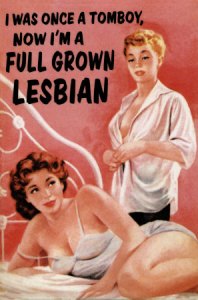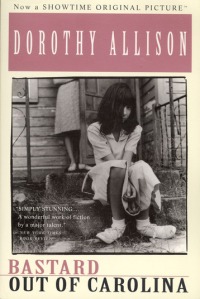My journey toward self acceptance as a lesbian (prior to taking on the mantle of “queer”) involved an exploration of lesbianism through the words of others — coming out stories, biographies, memoirs, journals, novels, short stories, magazine articles, anything I could find. Some of those works came recommended (Woman on the Edge of Time; Rubyfruit Jungle.) I gravitated to a few books because they were about women I idealized in some way, (Virginia Woolf’s journals or Gertrude Stein’s works.) Early during my coming out journey, if the word “lesbian” appeared anywhere at all, I grabbed it.
Yet very few of those books ever spoke to me, to my life experience. When I finally found one, I cherished it; re-reading it over and over — practically memorizing it. The book was Bastard Out of Carolina, by Dorothy Allison. That book seemed to tell the story of my life. In so many ways, from the nuances of dialect, specific childhood events, family dynamics, even the main character’s hopes and dreams, Bastard Out of Carolina captured me, eerily, memories included.
The main character, Bone, struggles with intensity, humor, and hard-wrought rejection of self-pity, which spoke to this adult, formerly abused child. Allison’s style, so reminiscent of Harper Lee or Flannery O’Conner, captures all five senses, effortlessly taking the reader into the world, the mind of Bone. While the novel does not explicitly explore Bone’s growth into adulthood, so her life as a lesbian may or may not be the case, Bone’s aunt Raylene Boatwright is a strong lesbian matriarchal figure. Raylene who not only protects Bone, but demonstrates to the reader that even impoverished, under-educated women, can rise above the label of “trash” and represent the strong, wise lesbians who live openly, independently, and generate the respect of every member of the family as well as the community around them.
As a lesbian author, Dorothy Allison uses semi-autobiographical material to create a powerful story of “otherness” on a plethora of levels, and upon each I felt connected. For the first time, I felt understood. For that, I cherish both Allison and my copy of Bastard Out of Carolina.


Wow, well said. I will be looking for a copy of my own. Thank you.
LikeLike
It’s pretty raw… Fair warning!
LikeLike
I read this and it left a deep impression on me as well. It is very powerfully written.
LikeLike
Thank you
LikeLike
Thank you so much. I appreciate your kind words
LikeLike